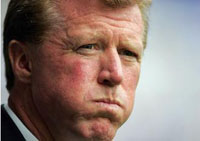England can't prove its weight in Europe

Business tycoons buy English soccer clubs, England’s matches are screened across the globe and its probably the wealthiest soccer league in the world.
So why can't England put 11 Englishmen on the field to succeed on the international level?
Steve McClaren became the latest coach to pay the price Thursday, getting fired after England's 3-2 loss at home to Croatia meant the team failed to qualify for the 2008 European Championship.
While the likes of World Cup champion Italy, Germany, Spain, France the Netherlands and Portugal will be out to try to take the title away from Greece, England's stars - including David Beckham, Wayne Rooney and Michael Owen - will have to watch the games on TV.
The Football Association now has plenty of time to search for a coach who can lift the nation credited with establishing the modern game to the same level.
Just one World Cup triumph on home soil back in 1966 isn't much of a return for one of the high-profile soccer nations. Coaches such as Bobby Robson, Kevin Keegan, Glenn Hoddle and Sven-Goran Eriksson couldn't even get the team to a championship final.
McClaren fared far worse: It's the first time England has failed to qualify for a major championship since the 1994 World Cup, and first failure to reach the Euros since 1984.
So just what is eating at English soccer?
Perhaps the fact that foreigners outnumber English players 2-1 in Premier League starting lineups.
Arsenal regularly fields lineups without a single Englishman. The Gunners have finished in the top four every season for over a decade, and lead the league this season.
Manchester United, a nine-time Premier League winner in the past 15 seasons, sometimes has up to five Englishmen in the lineup but often has only two. Chelsea and Liverpool rarely have more than three Englishmen. These four clubs are the only ones which regularly win titles or reach finals.
Thanks to the revenues gained from enormous TV contracts, Premier League clubs can pay huge salaries. That has helped attract big-name stars from Brazil, Argentina, Spain, Portugal and France.
Manchester United and Liverpool are owned by American investors and Chelsea by a Russian. Arsenal is the target of a possible Russian takeover.
The laws of the expanding European Union are another factor. The EU sees soccer players as employees who have the right to travel freely from country to country without the need for contracts. The influx of literally hundreds of overseas stars to English soccer means that young English talent gets little chance to shine.
The FA, whose role it is to administer the game in England as well as find a coach capable of winning titles, doesn't seem to know what the solution is.
"Everyone keeps saying that there aren't enough quality England players. Whether there are or whether there aren't is just conjecture," Premier League chairman Dave Richards said Thursdaywhen the FA announcedMcClaren's departure.
"The Premier League can't shoulder the responsibility always for the national team. The clubs are very successful and, if you look around the clubs and the players that are there to be picked from, there's a substantial amount."
Another problem is that none of the most successful coaches in the league are English.
The English coaches don't have the tactical flair to compete with Arsenal's Arsene Wenger (French), Manchester United's Alex Ferguson (Scottish), Liverpool's Rafa Benitez (Spanish) and Chelsea's Avram Grant (Israeli), who took over from Jose Mourinho (Portuguese).
While these coaches lead the title-chasing teams, the Englishmen are floundering with the likes of Wigan, Birmingham and Bolton, all near the foot of the standings. A glance at the current Premier League standings shows that only one coach in the top nine teams is English, and that's veteran Portsmouth manager Harry Redknapp.
England certainly has some talented players. Along with Beckham, Rooney and Owen are central defenders John Terry and Rio Ferdinand and goalscoring midfielders Steven Gerrard and Frank Lampard.
But England can't find a reliable goalkeeper.
Scott Carson's blunder in failing to hold onto a weak, long-range Croatian shot on Wednesday was a reminder of what happened when England faced Croatia in an earlier game. Paul Robinson also looked foolish when he tried to clear a back pass from teammate Gary Neville, the ball hit a divot and he missed it completely. He could only turn to watch the ball roll into his net.
Even long-serving David Seaman is remembered more for the ball sailing over his head into the net than for his saves, and David "Calamity" James is renowned for conceding goals after wildly racing off of his line.
Some critics of the current team also believe there are too many inflated egos within the wealthy squad of players that prevent them from playing as a team.
"I tend to think there are too many egos in there. I look at the England setup and they don't look a happy bunch for sure. The body language sometimes isn't great," said Roy Keane, the former Manchester United and Ireland captain who is now manager of Sunderland.
"I don't think that international football is that important to a lot to these players nowadays. Club football has definitely taken over especially to the top players who are involved in Champions League football. The egos are definitely a problem, particularly with the English players."
The biggest ego problem of all may lie with English soccer itself.
Many of the people associated with the team - players, coaches, officials, fans - seem to assume that England, as the so-called founder of the modern game, has some kind of right to win titles almost without kicking a ball.
After only 18 games in charge, McClaren now knows that's not true.
So will his successor.
Subscribe to Pravda.Ru Telegram channel, Facebook, RSS!


